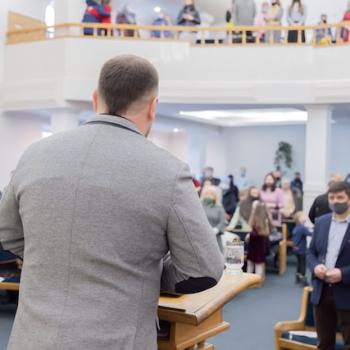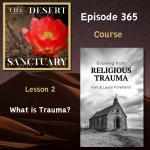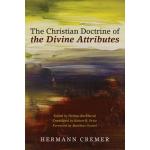
These days, to me, the Bible is both holy and confusing. It’s inspired, and it’s complex—and taking it seriously means something much more complicated (but also much more hopeful and interesting) than reading it as literal instructions straight from God to us.
In this world of ambiguity, some questions arise. If the Bible can mean so many different things to different people—and to different churches and denominations, not to mention different racial groups, ethnic groups, socioeconomic classes, genders, sexualities, and abilities—how do we find meaning in it at all? Do we find meaning in it?
I come to the Bible with so many more questions than I used to. And I think that’s a good thing. Good questions open up worlds of possibilities. And when we all come with our different questions, honest about what we’re looking for, maybe that’s where real faith community emerges.
So, what are we looking for? Many Christians would probably say that, for one thing, we’re looking for guidance. But what does that mean? And how do we do it?
How Specific is the Bible’s Guidance?
Sometimes when we talk about guidance, we might be expecting a particular passage or verse of scripture to speak into a particular situation in our lives in a specific way.
I don’t doubt that guidance can happen in this way. But I wonder if, more often, the Bible is meant to guide us in a more general way. Its stories are meant to shape the way we see the world and what on earth we’re supposed to be doing here.
I used to approach scripture more often with specific circumstances in mind, often particular decisions I was trying to make. I wanted God, through scripture, to tell me what to do.
I don’t think that’s necessarily a bad thing. But these days I wonder less about particular decisions and more about the kind of God revealed in the scriptures.
And these days I feel more of a sense of agency, a sense of responsibility. I’m not trying to pawn my decisions off onto God—as if the right Bible verse is there to tell me what exactly to do next in my career or in a particular relationship.
I’m trying to think and pray, seeking to live in a way that’s true to the core of Jesus’ life and teachings. I’m looking to live out what Jesus himself said was the most important message: love God and love people.
I’m not saying that more specific guidance can never be found. But I do wonder what we miss when we only look for specific answers to specific decision-making questions, rather than looking for the heart of the matter—and then seeking to live that out in everything we are.
Personal Guidance, Political Guidance
How might we let scripture shape our worldviews beyond the details of a particular personal situation?
And, relatedly: How might we look for guidance not just in our own day-to-day choices but also in how to approach and engage our complex world? How does scripture speak to the difficult issues of our time?
When it comes to guidance, these are questions worth asking.
I wonder if sometimes Christians look more to the Bible for guidance in matters that feel personal and more to pastors and Christian-identifying (often right-wing) politicians for guidance in matters that feel political.
How might we look to the Bible for political guidance in a thoughtful, open-minded way—apart from those who try (often successfully) to manipulate Christians into voting based only on particular views on a couple particular issues?
This feels important to me because it impacts policy and lawmaking on a national (US) level—sometimes drastically. And these policies and laws impact people’s real lives, especially the lives of the most vulnerable people among us.
Guidance That Welcomes the Stranger
It often feels, at least to me, like those who say they take the Bible most seriously are often—oddly and tragically—the ones least likely to actually want some of the Bible’s strongest and most consistent themes to become reality in our world.
Take, for example, the idea of welcoming the stranger and the foreigner, the immigrant and the migrant. This is huge throughout the Hebrew Bible. God calls God’s people over and over again to show kindness to the outsiders, foreigners, and immigrants among them.
How do those of us who are not (recent) immigrants welcome those who are? I can see how answers might vary, here, in some ways. But it seems to me that there are some clear wrong answers. Some things are not welcoming.
I’m thinking of border walls, militarized guards. I’m thinking of policies that make people wait in inhumane conditions or turn people away and send them back into violent and dangerous situations. Surely, whatever stranger-welcome looks like, this is not it.
Who is Guiding the 88 Percent?
This may sound quite clear. And yet, consider this analysis from history professor Kristin Kobes Du Mez, in Jesus and John Wayne: How White Evangelicals Corrupted a Faith and Fractured a Nation (highly recommend, by the way):
“More than any other religious demographic, white evangelicals see immigrants in a negative light. Two years into Trump’s presidency, more than two-thirds of white evangelicals did not think the United States had a responsibility to accept refugees. In 2019, nearly the same percentage supported Trump’s border wall. Given that the Bible is filled with commands to welcome the stranger and care for the foreigner, these attitudes might seem puzzling. Yet evangelicals who claim to uphold the authority of the Scriptures are quite clear that they do not necessarily look to the Bible to inform their views on immigration; a 2015 poll revealed that only 12 percent of evangelicals cited the Bible as their primary influence when it came to thinking about immigration.”
Fascinating. And complicated. Perhaps disheartening—or, depending on your experience, perhaps exactly what you might expect.
What does “uphold[ing] the authority of the Scriptures” even mean if the Bible isn’t a “primary influence” in thinking through important questions?
And when the Bible is not a primary influence, what else is? Who are the pastors, politicians, and other authority figures people are listening to? And how did their voices get strong enough in people’s minds and hearts to drown out the book they say they see as the word of God?
Again, questions worth asking.
The Bible Reveals God’s Nature
I don’t see biblical authority in the straightforward, literal, God-says-it-I-believe-it-that-settles-it way that many evangelicals do. But I do believe in the Bible as a source of guidance. I believe in the Bible as a “primary influence.”
I believe in the God revealed through scripture—a God whose character is love, whose very nature is to welcome the stranger and the immigrant. I believe in looking to the Bible for guidance in the things that are so strongly-worded, so consistently spoken, across its many books and the many centuries of their writing.
I believe the stories of the Bible are meant to get us thinking about our lives, our communities, and our world. I don’t believe they’re meant to be filtered through the kinds of pastors and politicians who want to tell people what to think, who set themselves up as having ultimate authority, not to be questioned or contradicted.
I believe in sacred texts that are meant to be wrestled with. Maybe some are meant to guide, some to perplex, some to challenge, some to warn, some to comfort. Not every text needs to have the same purpose.
I hope to be part of faith communities who look to the Bible for guidance in the things it clearly wants to guide us in—and who embrace our holy responsibility to decide for ourselves what loving God and loving people looks like for us.












